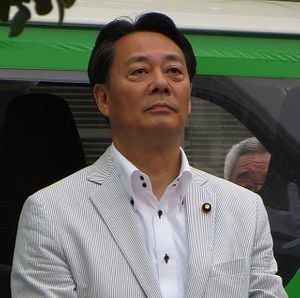The leader of Japan’s opposition party, the Democratic Party of Japan (DPJ), arrived in Beijing on Tuesday for a three day visit. Banri Kaieda was accompanied by a DPJ delegation for his first visit to China since assuming control of the DPJ in 2012. Kaieda met with Liu Yuanshan, a member of the Politburo Standing Committee, on Wednesday.
According to Japan Times, Kaieda hopes that his visit could be “the first step to improve the relationship of the two countries.” Kaieda has also said that he wants in particular to help pave the way for a meeting between top Japanese and Chinese leaders, something that has not happened since Shinzo Abe assumed office. CCTV said that Kaieda emphasized the importance of such top-level diplomacy and pushed for a bilateral meeting to take place during the upcoming APEC summit in November, which will bring Prime Minister Shinzo Abe to Beijing.
So far, China has dismissed calls for the APEC summit to also serve as a bilateral forum. When asked about the possibility of a Xi-Abe meeting, Foreign Ministry spokesperson Hong Lei merely reiterated China’s oft-stated position that Japan will need to make amends first. “The Japanese side should take concrete actions to remove political obstacles standing in the way of bilateral ties,” Hong said.
Kaieda may have more luck with his other mission: differentiating the DPJ from the ruling Liberal Democratic Party (LDP). According to Xinhua, Kaieda said that the DPJ will “seek candid dialogue” and try to “remove the obstacles” between Japan and China. Kaieda wanted in particular to make it clear that the DPJ does not support Abe’s move to reinterpret Japan’s constitution, allowing Japan to exercise collective self-defense. China has been crystal clear about its concern with an increasingly active Japanese military, and welcomes the fact that Kaieda’s party also disapproves of the decision.
Previously, Kaieda said in a statement that the Cabinet decision to reinterpret the constitution is “outrageous and opaque and above all totally ignores constitutionalism.” He added that the DPJ “cannot accept” the decision and called for it to be overturned. China has used similar rhetoric to criticize the move.
China has previously used contact with opposition politicians to express its displeasure with Abe, but this is the first time Beijing has welcomed the leader of the main Japanese opposition party. The meeting stands as a pointed contrast to Beijing’s continued refusal to extend such an invitation to Shinzo Abe himself, and thus implicitly promises better China-Japan relations under a DPJ administration.

































